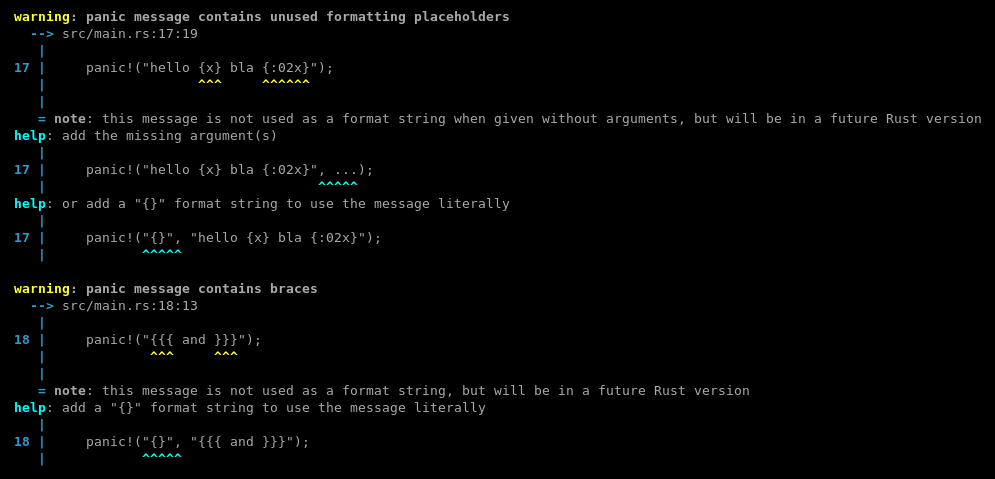Never inline naked functions
The `#[naked]` attribute disabled prologue / epilogue emission for the
function and it is responsibility of a developer to provide them. The
compiler is no position to inline such functions correctly.
Disable inlining of naked functions at LLVM and MIR level.
Closes#60919.
Add lint for panic!("{}")
This adds a lint that warns about `panic!("{}")`.
`panic!(msg)` invocations with a single argument use their argument as panic payload literally, without using it as a format string. The same holds for `assert!(expr, msg)`.
This lints checks if `msg` is a string literal (after expansion), and warns in case it contained braces. It suggests to insert `"{}", ` to use the message literally, or to add arguments to use it as a format string.

This lint is also a good starting point for adding warnings about `panic!(not_a_string)` later, once [`panic_any()`](https://github.com/rust-lang/rust/pull/74622) becomes a stable alternative.
The `#[naked]` attribute disabled prologue / epilogue emission for the
function and it is responsibility of a developer to provide them. The
compiler is no position to inline such functions correctly.
Disable inlining of naked functions at LLVM and MIR level.
Move capture lowering from THIR to MIR
This allows us to:
- Handle precise Places captured by a closure directly in MIR. Handling
captures in MIR is easier since we can rely on/ tweak PlaceBuilder to
generate `mir::Place`s that resemble how we store captures (`hir::Place`).
- Handle `let _ = x` case when feature `capture_disjoint_fields`
is enabled directly in MIR. This is required to be done in MIR since
patterns are desugared in MIR.
Closes: rust-lang/project-rfc-2229#25
r? ```@nikomatsakis```
add optimization fuel checks to some mir passes
Fixes#77402
Inserts a bunch of calls to `consider_optimizing`. Note that `consider_optimizing` is the method that actually decrements the fuel count, so the point at which it's called is when the optimization takes place, from a fuel perspective. This means that where we call it has some thought behind it:
1. We probably don't want to decrement the fuel count before other simple checks, otherwise we count an optimization as being performed even if nothing was mutated (ie. it returned early).
2. In cases like `InstCombine`, where we gather optimizations in a pass and then mutate values, we probably would rather skip the gathering pass for performance reasons rather than skip the mutations afterwards.
Improve the diagnostic for when an `fn` contains qualifiers inside an `extern` block.
This mitigates #78941. As suggested by ```@estebank,``` `span_suggestion` was replaced with `span_suggestion_verbose` for this specific diagnostic.
Make bad "rust-call" arguments no longer ICE
The simplest of bad rust-call definitions will no longer cause an ICE. There is a FIXME added for future work, as I wanted to get this easy fix in before trying to either add a hack or mess with the whole obligation system
fixes#22565
Fix setting inline hint based on `InstanceDef::requires_inline`
For instances where `InstanceDef::requires_inline` is true, an attempt
is made to set an inline hint though a call to the `inline` function.
The attempt is ineffective, since all attributes will be usually removed
by the second call.
Fix the issue by applying the attributes only once, with user provided
attributes having a priority when provided.
Closes#79108.
Handle empty matches cleanly in exhaustiveness checking
This removes the special-casing of empty matches that was done in `check_match`. This fixes most of https://github.com/rust-lang/rust/issues/55123.
Somewhat unrelatedly, I also made `_match.rs` more self-contained, because I think it's cleaner.
r? `@varkor`
`@rustbot` modify labels: +A-exhaustiveness-checking
type is too big -> values of the type are too big
strictly speaking, `[u8; usize::MAX]` or even `[[[u128; usize::MAX]; usize::MAX]; usize::MAX]` are absolutely fine types as long as you don't try to deal with any values of it.
This error message seems to cause some confusion imo, for example in https://github.com/rust-lang/rust/pull/79135#issuecomment-729361380 so I would prefer us to be more precise here.
See the added test case which uses one of these types without causing an error.
r? ``@oli-obk``
Updated the list of white-listed target features for x86
This PR both adds in-source documentation on what to look out for when adding a new (X86) feature set and [adds all that are detectable at run-time in Rust stable as of 1.27.0](https://github.com/rust-lang/stdarch/blob/master/crates/std_detect/src/detect/arch/x86.rs).
This should only enable the use of the corresponding LLVM intrinsics.
Actual intrinsics need to be added separately in rust-lang/stdarch.
It also re-orders the run-time-detect test statements to be more consistent
with the actual list of intrinsics whitelisted and removes underscores not present
in the actual names (which might be mistaken as being part of the name)
The reference for LLVM's feature names used is [this file](https://github.com/llvm/llvm-project/blob/master/llvm/include/llvm/Support/X86TargetParser.def).
This PR was motivated as the compiler end's part for allowing #67329 to be adressed over on rust-lang/stdarch
ExprKind::SelfRef was used to express accessing `self` in
the desugared Closure/Generator struct when lowering captures in THIR.
Since we handle captures in MIR now, we don't need `ExprKind::Self`.
This allows us to:
- Handle precise Places captured by a closure directly in MIR. Handling
captures in MIR is easier since we can rely on/ tweak PlaceBuilder to
generate `mir::Place`s that resemble how we store captures (`hir::Place`).
- Allows us to handle `let _ = x` case when feature `capture_disjoint_fields`
is enabled directly in MIR. This is required to be done in MIR since
patterns are desugared in MIR.